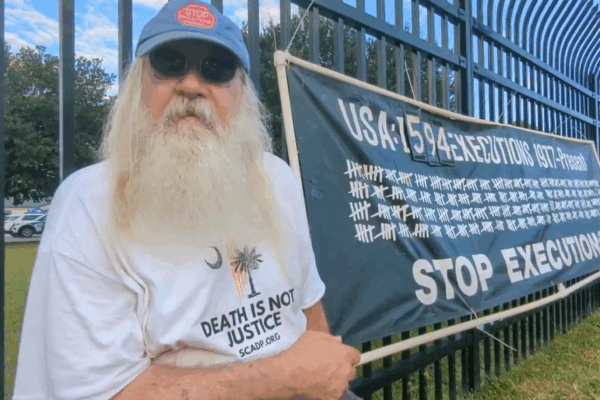I met Ron Kaz outside the death chamber at Broad River Correctional Institution. He sat on a folding chair beside a black banner covered in white tally marks.
“We’re about to murder a man here in South Carolina,” Ron said.
Ron has protested 43 executions in our state since 1985. We were gathered on September 20 to hold a vigil as South Carolina prepared to execute a man named Khalil Divine Black Sun Allah, formerly known as Freddie Eugene Owens.
This was to be the first execution in our state in 13 years. Like thousands of people, I had contacted Governor Henry McMaster’s office that week asking him to grant clemency, both because I abhor the death penalty and because the key witness in Khalil’s murder trial had admitted to lying. The person who answered the governor’s phone sounded polite but exhausted.
When the news came down that the state had killed Khalil with poison, Ron rose from the chair and supported himself with a cane as he attached a new number to his banner. Now it read, “USA: 1,595 EXECUTIONS 1977 – Present.”
While death sentences and executions have declined nationwide since the late ‘90s, several states including ours are scheduling executions as rapidly as the courts will allow. The string of executions beginning with Khalil Allah on Sept. 20 and ending with the nitrogen hypoxia killing of Alan Miller in Alabama on Sept. 26 marked the first time in 20 years that U.S. governments carried out 5 executions in the space of a week.
Our politicians had to get creative to start this grim renaissance. Like many of the remaining states that kill their own citizens, South Carolina passed a “shield law” to hide information from the public about lethal injection drugs. Electrocution also remains an option. Our lawmakers even passed a law creating a firing squad to shoot imprisoned people through the chest.
As states like ours resume killing, longtime activists and people of faith have been welcoming newcomers like me to the fight against the death penalty. Fewer than half of Americans now believe the death penalty is applied fairly, a figure we can expect to keep plummeting as egregious miscarriages of justice — like Missouri’s Sept. 24 killing of Marcellus Williams despite objections from the victim’s family and the prosecutor — make it into the international spotlight.
As I paced outside South Carolina’s death chamber last Friday evening, I met several people like Ron Kaz who had been working to end the death penalty since before I was born. I met a Catholic priest who spoke gently and led prayers with people who had come to hold a vigil. One man knelt silently in the itching grass for two hours, clutching rosary beads with his eyes closed.
Then there was Hayden Laye, a fiery young activist from the Upstate who leads Democrats for Life of South Carolina. There was the Rev. David Kennedy, president of the Laurens County NAACP, greeting young activists with an embrace and an encouraging word. And of course there was the Rev. Hillary Taylor, steadfast leader of South Carolinians for Alternatives to the Death Penalty, offering words of peace when there was nothing left to say.
All at once, I was both heartened by the presence of elders in the death penalty abolition movement — and sorrowful that their lifelong advocacy had not turned the tide in our state. What will it take, I wondered, for the state that killed George Stinney to give up the bloody heirloom of execution once and for all?
Whether through the courts or the legislative chambers, I have faith that we will win. State execution is a brutal and immoral spectacle that tortures the condemned, traumatizes those working in the death chamber, and fails even as a deterrent to homicide. We can’t build a just state unless we stop the state from killing people.
We are going to end the death penalty. We must. Will you join us?
If you would like to help end the death penalty and campaign for clemency, join the South Carolinians for Alternatives to the Death Penalty mailing list on their website, scadp.org. To learn more about our legal fight to publish an interview with a man held on Death Row, visit the case page for ACLU-SC v. Stirling.


